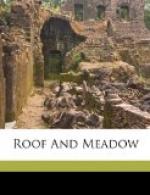The windows of my roost look out over roofs of slate, painted tin, and tarry pebbles, into a chimney-fenced plot of sky. Occasionally, during the winter, a herring-gull from the harbor swims into this bit of smoky blue; frequently a pigeon, sometimes a flock, sails past; and in the summer dusk, after the swallows quit it, a city-haunting night-hawk climbs out of the forest of chimney-pots, up, up above the smoke for his booming roofward swoop. But winter and summer, save along through June, the sparrows, as evening falls, cut across the sky field on their way to the roost in the old burial-ground. There go two, there twoscore in a whirling, scudding flurry, like a swift-blown bunch of autumn leaves. For more than an hour they keep passing—till the dusk turns to darkness, till all are tucked away in bed.
One would scarcely recognize the birds as they sweep past in these flurries, their flight is so unlike their usual clumsy scuttle as they get out of one’s way along the street. They are lumpish and short-winged on the street; they labor and lumber off with a sidewise twist to their bodies that reminds one of a rheumatic old dog upon the trot. What suggestion of grace or swiftness about them upon the ground? But watch them in their evening flight. It is a revelation. They rise above the houses and shoot across my sky like a charge of canister. I can almost hear them whizz. Down by the cemetery I have seen them dash into view high up in the slit of sky, dive for the trees, dart zigzag like a madly plunging kite, and hurl themselves, as soft as breaths, among the branches.
This is going to bed with a vengeance. I never saw any other birds get to roost with such velocity. It is characteristic, however; the sparrow never does anything by halves. The hurry is not caused by any mite of anxiety or fear, rather from pure excess of spirit; for after rearing three broods during the summer, he has such a superabundance of vim that a winter of foraging and fighting is welcome exercise. The strenuous life is his kind of life. When the day’s hunt is over and he turns back to his bed, why not race it out with his neighbors? And so they come—chasing, dodging, tagging neck and neck, all spurting to finish first at the roost.
We may not love him; but he has constitution and snap. And these things do count.
One April morning, the 6th, I went down to the roost at three o’clock. The sparrows were sleeping soundly. It was yet night. Had the dawn been reaching up above the dark walls that shut the east away from the high tree-tops, the garish street light would have kept it dim. The trees were silent and stirless, as quiet as the graves beneath them—more quiet; in fact; for there issued from a grated hole among the tombs the sound of an anvil, deep down and muffled, but unmistakably ringing, as if Governor Winthrop were forging chains in his vault. Then came a rush, a deadened roar, and an emanation of dank gaseous breath, such as the dead alone breathe.




